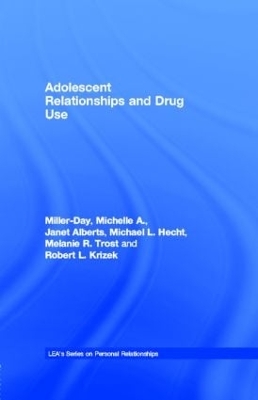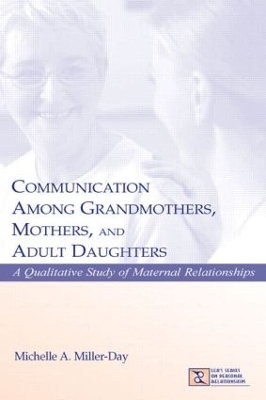LEA's Series on Personal Relationships
2 total works
Adolescent Relationships and Drug Use
by Michelle A. Miller-Day, Janet Alberts, Michael L. Hecht, Melanie R. Trost, and Robert L. Krizek
Adolescent Relationships and Drug Use explores the communicative and relational features of adolescent drug use. It focuses on peer norms, risk, and protective factors and considers how drugs are offered to adolescents, examining such factors as who makes the offers and how they are resisted, where the offers take place, and what relationship exists between the persons making the offers and the persons receiving them. Unlike other studies of drug resistance, this work examines the communication processes that affect adolescents' ability to effectively resist drug offers. Michelle Miller and her colleagues study how personal qualities, communication skills, and relationships with others affect an individual's ability to resist offers of drugs.
This volume provides a detailed analysis of drug resistance in the context of such factors as relationships, types of drugs, family and peer group relationships, personality, and situations. It places drug use and resistance in a living, relational context, and offers the first comprehensive communication and relational approach to drug resistance. The authors argue for the development of a relational and communication competence model of drug resistance, and suggest unique approaches for future drug prevention efforts.
In describing the social and relational processes of drug resistance and then linking intervention techniques to the adolescents' relational world, this work makes a major contribution toward understanding drug use among adolescents. It informs relationship, communication, and psychology research, assists drug and health research by presenting new ways of considering the issue, and enlightens drug resistance practice by demonstrating a new approach to prevention. As such, it makes an effective and invaluable contribution to the ongoing efforts to reduce drug use among adolescents.
Communication Among Grandmothers, Mothers, and Adult Daughters
by Michelle A. Miller-Day
This volume examines communication processes within the grandmother-mother-daughter relationship, emphasizing an intergenerational perspective. Using observations of and extensive interviews with six sets of middle-income, Caucasian female family members, this book offers a heuristic account of intergenerational mother-daughter relational communication.
Author Michelle Miller-Day integrates and juxtaposes alternative experiences of social interaction, situating readers in the world of grandmothers, mothers, adult daughters, and granddaughters as they experience, describe, and analyze their family communication. Miller-Day incorporates aged mothers and younger mid-life mothers and their adult daughters into the research to illustrate how this type of maternal relationship is experienced at different points in a woman's life. With the inclusion of three generations of women, Miller-Day offers multigenerational perspectives on family, and examines them for patterns of maternal interaction, providing symbolic links across generational boundaries.
Communication Among Grandmothers, Mothers, and Adult Daughters enables readers to understand more completely the richly textured nature of maternal relationships. It will be an invaluable resource for scholars and researchers in the areas of communication and relationships, including family communication, intergenerational communication, women's studies, family studies, interpersonal communication, and relationships, as well as social workers, psychologists, and counselors, who strive to understand family communication processes and their dynamics across generational lines.

